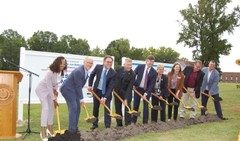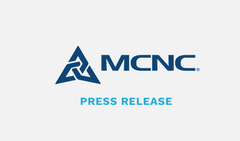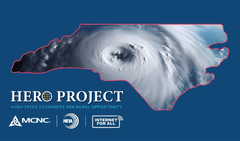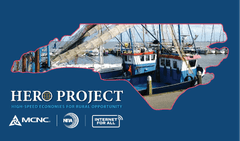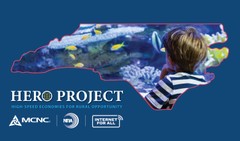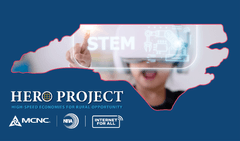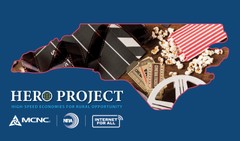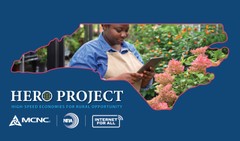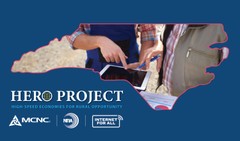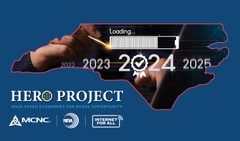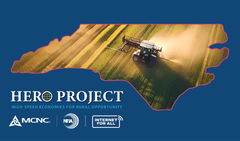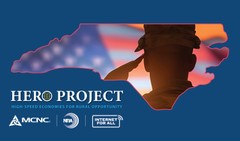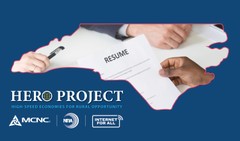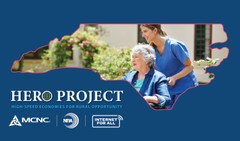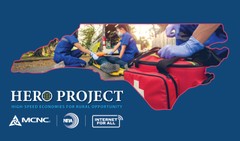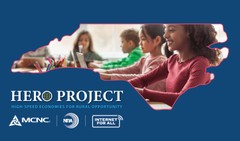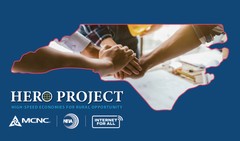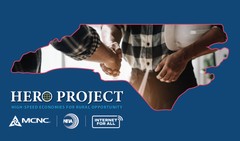HERO Project: Broadband is the backbone of modern libraries in North Carolina
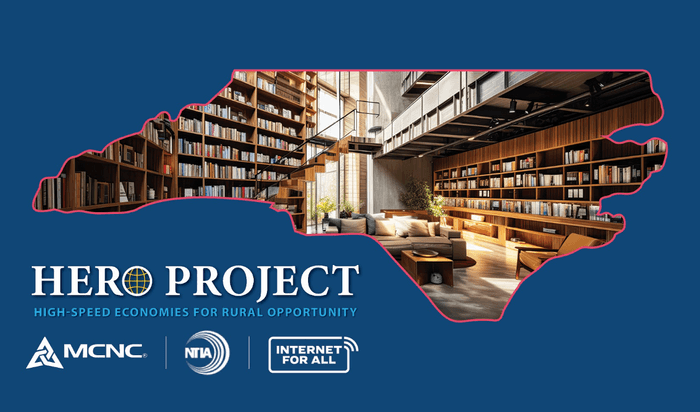
Public libraries connect communities and enrich our lives in ways we may not fully realize. They are quintessential community anchor institutions and vital to both urban and rural areas. But, many in underserved and overlooked regions of North Carolina are at a disadvantage due to the lack of broadband.
MCNC understands this challenge and recognizes that high-speed internet is pivotal for public libraries to serve their communities. MCNC’s HERO (High Speed Economies for Rural Opportunities) Project aims to ensure that the important role libraries have always played in the state continues to move forward in today’s digital age.
History of Innovation
In 1700, the Reverend Thomas Bray organized a collection of books to be sent to St. Thomas Parish located in the Town of Bath in eastern North Carolina. This book collection became known as the first public library in the American colonies. No other public library would exist in North Carolina during the colonial period. Then, between 1794 and 1848, 32 library societies were incorporated by the N.C. General Assembly. By 1897, the Durham Public Library became the first free, tax-supported public library in North Carolina.
Today, there are more than five million registered library users in North Carolina, recording nearly 20 million visits a year. From those visits, as reported in 2023, nearly two million used a public computer to access the internet.
Did You Know?
Jean Armour Polly was one of the first librarians in the United States to offer computer and internet access to the public. In 1992, she wrote and published one of the first “non-technical” public guides to the internet, Surfing the Internet (she is often credited with coining the phrase), becoming a respected resource on internet use. In 2019, Polly was inducted into the Internet Hall of Fame for evangelizing computers and there use in public libraries, the precursor to the internet being offered as a core service in those spaces.
Impacting Key CAIs in NC
Community Anchor Institutions (CAIs) are defined as public institutions that provide a service to the public or are facilities where the public gather to be educated, gain information, or receive care. MCNC currently serves the broadband needs of many CAIs throughout North Carolina. View the MCNC Community Map. However, many CAIs located in rural and underserved areas of the state, such as libraries, still lack the access and proper amount of bandwidth they require to serve their constituents.
There are approximately 410 public libraries currently in North Carolina. In 2012-2013, MCNC completed a massive expansion of its network through the Golden LEAF Rural Broadband Initiative, which at the time positively impacted 254 libraries along the construction routes. Today, the HERO Project is adding 209 additional miles to the MCNC’s 4,536-mile network, with an estimated 10 libraries located on the project routes. And, it doesn't stop with just high-speed internet; since once connected to MCNC’s network, other value-added services such as cybersecurity, data center, E-Rate, training, consulting, and more become available. Libraries also gain access to Internet2 and other important resources through their connection with MCNC, which includes access to national digital resources via the Internet2 Community Anchor Program.
Read how MCNC helps libraries turn the page with high-speed internet.
The Significance of Modern Libraries
Libraries play an important role in society by providing access to information and resources, promoting literacy and education, and preserving cultural heritage. As libraries incorporate more technology into their service offerings, high-speed and secure internet access is a must.
Here are just a few reasons why reliable broadband is essential in today's digital age:
Digital Resources: Libraries offer a vast array of online resources like eBooks, audiobooks, educational databases, and research tools. Slow or unreliable internet hinders their usefulness.
Public Access. Libraries provide free internet access to those who may not have it at home. This is crucial for job searching, online learning, and connecting with government services.
Programs and Services: Many libraries offer programs and services that rely on broadband, like online tutoring, virtual story time, and job training workshops.
Bridging the Digital Divide: Libraries play a key role in digital opportunities by offering public access to technology and the internet. Reliable broadband is essential for fulfilling this mission.
Investing in Modern Libraries
New technologies continue to emerge and shape modern life. With these shifts, the needs of library patrons and students also evolve. Reliable broadband empowers libraries to meet those needs and better serve their communities.
MCNC remains community-focused by providing broadband technologies and solutions to libraries throughout North Carolina. MCNC also has been a member of The Schools, Health, and Libraries Broadband (SHLB) Coalition and regularly collaborates in national conversations to help libraries and other important CAIs.
Investing in broadband infrastructure is an investment in the future. There are still many areas of the state where citizens do not have access to basic broadband. MCNC has a vision of digital opportunities, and the HERO Project is part of a long-term endeavor to unlock the full potential of everyone in North Carolina. MCNC’s HERO Project is a step forward to keep libraries and other CAIs from falling behind and being forgotten.
Construction for the HERO Project is expected to begin this summer with completion planned for June 2025.
